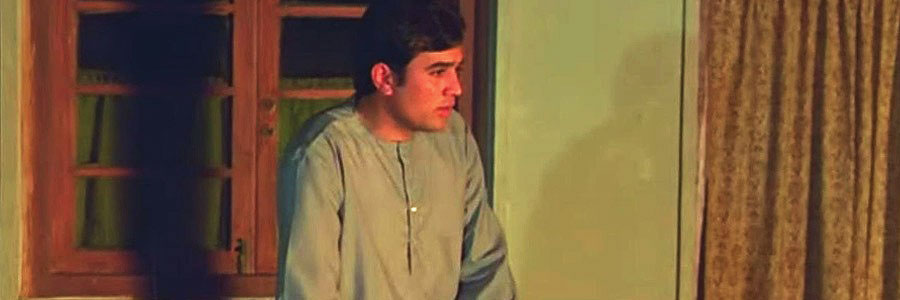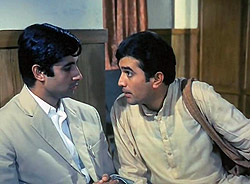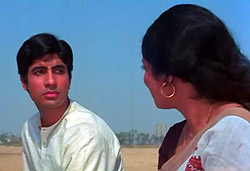
Anand

ANAND (MOVIE)
Rupam Chitra
Original release: March 5th, 1971
Running time: 122 minutes
Country of origin: India
Original language: Hindi
Director: Hrishikesh Mukherjee
Cast: Rajesh Khanna, Amitabh Bachchan

There are some films that stay with you for a lifetime. Whether it’s a great romance, a classic adventure or maybe even a heartfelt drama about friendship, once the elements of story, directing, cinematography, acting, editing and sound combine to create something affecting, a film can have the power to live several lifetimes, maybe even forever, transcending both time and space.
Anand is such a film. I recall seeing it only once when I was a child, sitting on the floor and playing with my toys while my family and extended family gathered on the sofas and any other nearby chairs to watch the film on our black and white television.
I remember the songs vividly but more than anything else I remember seeing tears on everyone’s faces once the film had finished and not really understanding what made them all feel so sad. Even more baffling, was that they all seemed to have enjoyed this crying session.
It was only in the past year I got to see Anand again. This was my first time watching it in colour but aside from that, finally I was able to understand what the story was about.
Loosely modelled on Akira Kurosawa’s Ikiru (1952), it tells the story of Anand Sehgal (Rajesh Khanna), a cheerful and extremely likeable fellow always with a smile and a twinkle in his eye. However, Anand is suffering from lymph sarcoma of the intestine. He meets the young and terribly serious Dr. Bhaskar Bannerjee (Amitabh Bachchan) and decides to try and bring some happiness to his life. After all, Anand knows that he is dying and there is no cure for his disease, so why waste what little precious time he has wallowing in sorrow when he can spend it being happy and spreading that happiness if he can.

Anand stays with Bhaskar instead of going to the nursing home and sees that the doctor’s seriousness is not just in his work but even in his personal life. Though he likes Renu (Sumita Sanyal), a former patient, he is too shy to approach her about his feelings but gradually Anand’s joy for life reaches him too.
Over the course of the film Bhaskar comes to appreciate the people around him and learns to express those feelings. It’s at this point I began to realise why the film affected my family so much and why they still continue to talk about it when they recall their memories of films they’ve seen and fell in love with.
Watching the friendship blossom between these two men who come to greatly admire and care for each other, but knowing that one is terminally ill still doesn’t prepare you emotionally for when Anand’s health takes a turn for the worse. As he holds on, waiting for Bhaskar to arrive to say goodbye I found myself fighting back my own tears and succumbing to the power of the story the same as I saw my family did some 30 years previously.
It struck me as a somewhat unusual story in terms of the popular Indian films I had grown up with, and at first I couldn’t put my finger on why exactly that was. M.K.  Raghavendra remarks on a few ways in which Anand stood out from contemporary films at that time:
Raghavendra remarks on a few ways in which Anand stood out from contemporary films at that time:
Narrated as a flashback by Bhaskar as he pays tribute to Anand, the film’s message is so clear and universal; that life should be grand rather than long. It’s a celebration of humanity and the short time we’re all here for and it’s not hard to see why it’s still so loved and why those I know who have seen it remember it so well.
- M.K. Raghavendra, Seduced by the Familiar (2009) Second Edition, Oxford University Press. p.185 [1]
As a film that went on to popularize the genre of films where the protagonist suffers from a terminal illness, Anand won Rajesh Khanna a Filmfare Award for Best Actor, while the fresh-faced Amitabh Bachchan won the Best Supporting Actor Award. Their performances are magnificent throughout and the songs featured in the film, particularly Kahin Door Jab Din Dhal Jaaye (sung by Mukesh), have stayed with me my entire life so far and like the film and its message, will continue to do so.

Patrick Samuel
The founder of Static Mass Emporium and one of its Editors in Chief is an emerging artist with a philosophy degree, working primarily with pastels and graphite pencils, but he also enjoys experimenting with water colours, acrylics, glass and oil paints.
Being on the autistic spectrum with Asperger’s Syndrome, he is stimulated by bold, contrasting colours, intricate details, multiple textures, and varying shades of light and dark. Patrick's work extends to sound and video, and when not drawing or painting, he can be found working on projects he shares online with his followers.
Patrick returned to drawing and painting after a prolonged break in December 2016 as part of his daily art therapy, and is now making the transition to being a full-time artist. As a spokesperson for autism awareness, he also gives talks and presentations on the benefits of creative therapy.
Static Mass is where he lives his passion for film and writing about it. A fan of film classics, documentaries and science fiction, Patrick prefers films with an impeccable way of storytelling that reflect on the human condition.
© 2022 STATIC MASS EMPORIUM . All Rights Reserved. Powered by METATEMPUS | creative.timeless.personal. | DISCLAIMER, TERMS & CONDITIONS
HOME | ABOUT | CONTACT | TWITTER | GOOGLE+ | FACEBOOK | TUMBLR | YOUTUBE | RSS FEED
CINEMA REVIEWS | BLU-RAY & DVD | THE EMPORIUM | DOCUMENTARIES | WORLD CINEMA | CULT MOVIES | INDIAN CINEMA | EARLY CINEMA
MOVIE CLASSICS | DECONSTRUCTING CINEMA | SOUNDTRACKS | INTERVIEWS | THE DIRECTOR’S CHAIR | JAPANESE CINEMA





